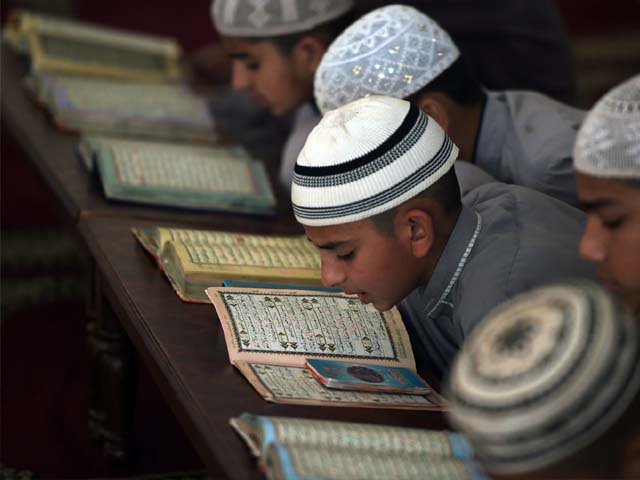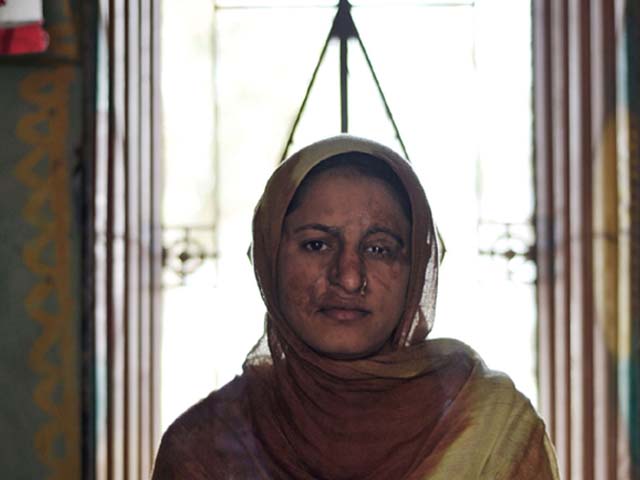
Pakistani students at a madrassa recite the Quran. PHOTO: AFP
Why are we silent about the sexual abuse at madrassas?
Many religious clerics enjoy great influence in their localities, making reporting cases of abuse even harder
Of late, many individuals in Pakistan have finally begun to confront the long festering issue of sexual harassment, with several brave victims choosing to speak out about such issues despite the repercussions that often follow such admissions. Harassment and abuse, whether at the workplace, at a university or at ones own home desperately need to be tackled, yet, we as a nation are still largely reticent to openly acknowledge and discuss these matters. This is made all the more problematic when religion is thrown into the mix. For years, it has been silently acknowledged that many madrassas (religious seminaries) in Pakistan are hubs of sexual abuse, where children sent in to receive a religious education are often exploited, harassed, molested and raped by the teachers. There are a whole host of issues as to why this abuse goes unreported and the perpetrators are not brought to justice.
Firstly, many of the religious clerics who run such seminaries or teach at them enjoy a great deal of power and influence in their localities. Therefore, any accusation levelled against them or their institution is often met with a unanimous attack against the victim rather than the accused. As a result, it has been reported that police personnel are also routinely paid off in an attempt to ensure that these cases are not pursued. Secondly, such accusations are also foolishly seen as an attack on Islam. To claim that accusing a religious cleric of sexual abuse will somehow taint the religion he practices or has studied is a complete logical fallacy.
Thirdly, this problem is worsened by the fact that many madrassas in Pakistan are not registered, thus making it very difficult to monitor their activities. Reportedly, Pakistan plans to bring more than 30,000 madrassas currently operating in the country under government control. But till the state or primary religious authority administers these madrassas, the abuse which many students face goes by unreported and these predators continue to target child after child without any repercussions. Fourthly, as in the aftermath of many other crimes in the country, families either choose to, or are coerced, into forgiving the perpetrators. As a result, the criminals are not brought to justice and the epidemic of sexual abuse continues unchecked.
Lastly, many madrassas in Pakistan provide food, a place to stay and basic education to thousands of children. Due to these additional facilities and the provision of these amenities, several poorer households choose to enroll their children in madrassas. Therefore, even when cases of sexual abuse do emerge, many families are simply reluctant to take action against the institution which is ‘looking after’ their child. Due to the economic compulsions and monetary dependence, many parents choose to say silent and look the other way. As a result, poverty can force families to ensure the systemic abuse that their child is facing. However, it seems that sexual abuse at madrassas is not a Pakistan specific problem. Religious seminaries in Bangladesh, India and Nigeria are also plagued with the same problems.
Clearly, no religion teaches any of these wrong-doings, but until we hold these perpetrators responsible we will continue to fundamentally destroy the lives of the youth in this country. It is imperative that not only should we as a nation collectively denounce such acts but the state must also work towards finding immediate solutions to this problem. If Pakistan is to address this crisis then it is crucial that religious clerics in the country come out and openly decry such behavior and state that such reprehensible acts taking place at madrassas must be reported. Given the say that religious clerics have in these madrassas, they must also acknowledge recent incidents of abuse and take immediate action to ensure transparency in the currently convoluted madrassa system. Additionally, an awareness campaign centred around sexual harassment and abuse is the need of the hour, which could help ensure that children and parents become aware of the fact that such behaviour should not be allowed to slip through the cracks, like it currently does.
[poll id="795"]


COMMENTS
Comments are moderated and generally will be posted if they are on-topic and not abusive.
For more information, please see our Comments FAQ